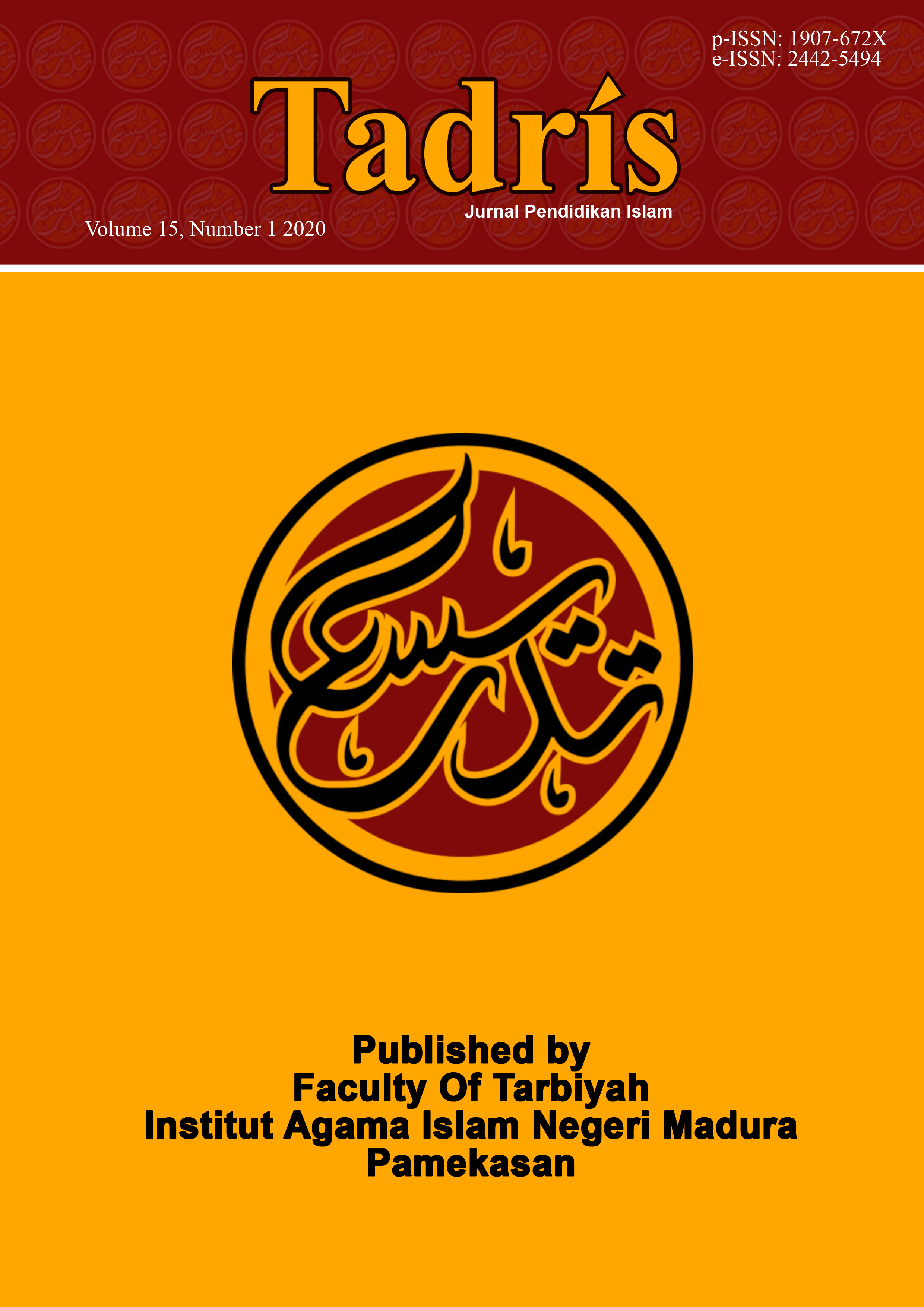Neurosains dan Spiritualitas dalam Pendidikan Islam
 Abstract views: 1593
,
Abstract views: 1593
,
 PDF downloads: 1731
PDF downloads: 1731
Abstract
Advances in information and communication technology in the Digital Revolution Era, in addition to positive impacts, also had a negative impact on human character, such as individualist, materialist attitudes, and even rejecting spiritual aspects. Therefore, we need the concept of Strengthening Character Education by optimizing the role of Islamic Religious Education in Schools to educate students who have faith, taqwa, and have good character according to their fitrah. To answer this need, a library research study was conducted which analyzed several papers that were relevant to the hermeneutic approach and content analysis method. This article finds that the optimization of Islamic Religious Education in Strengthening of Character Education in schools can be done by: first, strengthening the character of Muslim teachers who emulate the character of the Prophet SAW as a true educator; secondly, optimization of Islamic Religious Education in Class-based Strengthening Character Education with a tauhid-based science paradigm, integrating Islamic values in learning, and strengthening Islamic Religious Education materials in schools; third, optimization of Islamic Religious Education in school-based Strengthening Character Education by implementing the concept of taqwa-based Islamic education and making surau as a character labor; and fourth, the optimization of Islamic Religious Education in community-based Strengthening Character Education by organizing Islamic parenting and school collaboration with parents and the community in strengthening the character of students.
Downloads
References
Adlina, Atika Ulfia, Sufi Healing dan Neurosains Spiritual bagi Pasien Skizofrenia di Yayasan Jalmah Sehat Desa Bulungkulon, Kudus, [Jurnal Akhlak dan Tasawuh vol. 05, no. 01 2019].
Ardian, Iwan, Konsep Spiritualitas Dan Religiusitas (Spiritual And Religion) Dalam Konteks Keperawatan Pasien Diabetes Melitus Tipe 2, [Jurnal Keperawatan dan Pemikiran Ilmiah, vol. 2, No. 5 2016].
Bastaman, Hana Djumhana. Integrasi Psikologi Dengan Islam; Menuju Psikologi Islam. Yogyakarta : Pustaka Pelajar, 1995.
Buzan, Tony, The Power of Spiritual Intelligence “10 Ways to top you Spiritual Genius”.diterjemahkan oleh Ana Budi Kuswandani dengan judul Kekuatan ESQ. Cet. III; t.tp: Pustaka Delapratasa, 2003.
Frankl. Man Search For Meaning: Mencari Makna Hidup, Hakekat Kehidupan, Makna Cinta, Makna Penderitaaan. Bandung : Nuansa. 2004.
Goleman, Daniel. Working With Emotional Intelligence. (Terjemahan Alex Tri Kuntjono W. Jakarta : PT Gramedia Pustaka Utama. 2000.
Gunawan, Heri. Pendidikan Islam: Kajian Teoritis dan Pemikiran Tokoh. Bandung : PT. Remaja Rosdakarya. 2011.
Haeriyyah, Spiritual Quotitient (SQ) Dalam Analisis Neurosains. Ash-Shahabah, [Jurnal pendidikan Islam vol. 3, no. 2 Juli 2017].
Hidayat, S., & Wakhidah, A. N, Konsep Pendidikan Islam Ibnu Khaldun Relevansinya Terhadap Pendidikan Nasional, [Jurnal Studi Islam, vol. 16, no. 1 2015]
Muzani, Saiful, Pandangan Dunia dan Gagasan Islamisasi Ilmu Syed Muhammad Naquib Al-Attas, [Jurnal Hikmah, No. 3 Juli-Oktober 1991].
Pasiak, T. Tuhan Dalam Otak Manusia. Bandung : Mizan. 2012.
Pebian, Rio, dkk, Spiritualitas, Doa Dan Prestasi Belajar, [Jurnal Pendidikan Islam vol. 3, no. 02 2018].
Rohman, Miftahur, & Hairudin, Konsep Tujuan Pendidikan Islam Perspektif Nilai-Nilai Sosial Kultural Al-Tadzkiyyah, [Jurnal Pendidikan Islam, vol. 9, No. I 2018].
Rusmin, Muhammad B, Konsep Dan Tujuan Pendidikan Islam, [Jurnal Inspiratif Pendidikan vol. 6, no. 1, Januari - Juni 2017].
Sa’diyah, Halimatus, Spiritualitas Pendidikan Islam Perspektif Syed Muhammad Naquib Al-Attas [Jurnal Tadrîs vo. 8, no. 2 Desember 2013].
Sholeh, Khudori. Pemikiran Islam Kontemporer. Yogyakarta : Penerbit Jendela. 2003.
Suyadi. Teori Pembelajaran Anak Usia Dini SD Dalam Kajian Neurosains. Bandung : PT Remaja Rosdakarya. 2017.
Tim Penyusun Kamus Pusat Pembinaan dan Pengembangan Bahasa Departemen P & K, Kamus Besar Bahasa Indonesia, Edisi Kedua. Cet. III; Jakarta: Balai Pustaka, 1994.
Wulandari, Apri, Pengembangan Emosi Positif Dalam Pendikan Islam Perspektif Neurosains, [Jurnal Tadrib, vol. 5, no. 1, Juni 2019].
Yakin, Ainul, Spiritualitas Dalam Pendidikan Islam Perspektif Muhammad Naquib Al-Attas, [Jurnal MAHAROT: Journal of Islamic Education vol. 2, no. 2, Juli – Desember 2018].
Copyright (c) 2020 TADRIS: Jurnal Pendidikan Islam

This work is licensed under a Creative Commons Attribution-NonCommercial 4.0 International License.
The journal operates an Open Access policy under a Creative Commons Non-Commercial 4.0 International license. Authors who publish with this journal agree to the following terms:
- Authors retain copyright and grant the journal right of first publication with the work simultaneously licensed under a
 Commons Attribution-NonCommercial 4.0 International License
Commons Attribution-NonCommercial 4.0 International Licensethat allows others to share — copy and redistribute the material in any medium or format, and adapt — remix, transform, and build upon the material.
- Authors are able to enter into separate, additional contractual arrangements for the non-exclusive distribution of the journal's published version of the work (e.g., post it to an institutional repository or publish it in a book), with an acknowledgement of its initial publication in this journal.
- Authors are permitted and encouraged to post their work online (e.g., in institutional repositories or on their website) prior to and during the submission process, as it can lead to productive exchanges, as well as earlier and greater citation of published work (see The Effect of Open Access).














